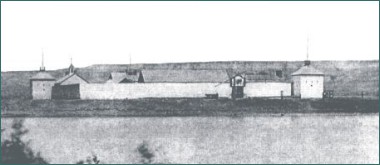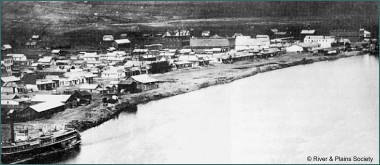The levee at Fort
Benton saw its first visitor when Captain Meriwether Lewis,
beating a hasty retreat from the Blackfeet, boarded his
canoe here and hurried down river.
During the early years of the
fort the levee was a quiet place. A few keel boats were
tied up, canoes and bullboats rested on the bank and
mackinaws were under construction for the 2600 mile, one-way
trip, with buffalo robes, to St. Louis.
|

|
 |
That all
changed overnight with the arrival of the first steamboat in
1860 and discovery of gold in 1862. Buildings sprang up on
the levee for over a mile upriver from the fort. Fort
Benton became the world's innermost port...and the toughest
town in the West. With the civil war over and the glint of
gold in most people's eyes. Southerner and Yankee alike
headed upriver to strike it rich. For ten years people from
all walks of live came and went across the Fort Benton
levee. There was little or no law on the upper river except
for vigilante justice. |
With the arrival of the
Northwest Mounted Police north of the border in 1874, Fort
Benton took on an air of respectability. The Golden Years
of the 1880's brought brick buildings, prosperity, families,
law and order. Large numbers of steamboats continued to
dock until the railroad arrived, when it all ended as
rapidly as it had begun. The levee returned to a more
peaceful time and those wild days of the past can only be
relived in your imagination.
|
 |
Today
as you walk along the
steamboat levee and the historic district and read the many
interpretive signs that help to bring the wild times alive
once more and you will soon understand why Forbes named Fort
Benton as one of the fifteen "prettiest towns in America"
and National Geographic Traveler recommends visiting Fort
Benton. |
Tour the Historic District and
Steamboat Levee
|